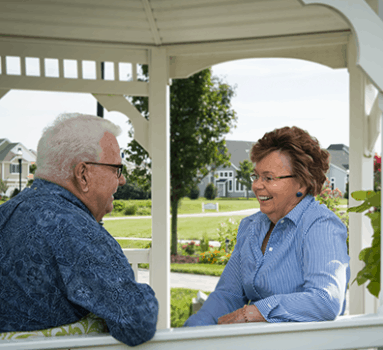The Many Health Benefits of Playing & Listening to Live Music

Listening to music provides a plethora of benefits, especially to senior adults. In varying ways, music soothes the soul, calms the heart, and evokes nostalgia, bringing back beautiful memories. Almost by magic, music serves different roles in the process; some melodies have become part of one’s memories, and some become a backdrop of those memories, embedding themselves into the brain as what many scientists call a reminiscence bump.
The reminiscence bump, according to the National Center for Biotechnology Information, is “an autobiographical memory from youth and early adulthood observed in adults over 40.” If you would like to reminisce about the many joyful parts of your childhood, putting on your beloved tracks from years gone by is the key!
Astoundingly, there are also many health-related advantages to listening to music, yet not many are aware of them. How can sitting back and replaying old favorite playlists keep your mind and body in tune? Here are the ways:
Music Reduces Stress
Many studies suggest the beneficial impact of music due to its stress and anxiety-reducing effects. With instances proving that listening to music can trigger brain activity linked to emotions, your favorite playlists can modulate anxiety levels too!
One study, in particular, found that music with 60 beats per minute “can cause the brain to synchronize” and induces alpha brain waves. Alpha brain waves are created when you are conscious and relaxed. This is because blood flows more easily when slower music is played. As a result, there is a decrease in the stress hormone cortisol, lower blood pressure, and reduced heart rate.
What type of music eases stress the most? The ones that top the list are stringed instruments from the Celtic, Indian, and Native American cultures, as well as drums and flutes. However, the answer rests on you, the listener. When you listen to your favorite song, your connection to it plays a major role in what makes it relaxing. Some may prefer classic rock or bluegrass. These may induce the same brain waves as when another person listens to jazz or dubstep. Music preference is one hundred percent relative, so don’t put it in a box when it comes to health benefits.
Music Improves Cognitive Function
Studies show that seniors who played an instrument when they were younger have a better memory. According to a TedEd talk by Anita Collins, musicians’ memories have more efficiency in creating, storing, and retrieving functions. This can be attributed to the musician’s highly connected brain network that passes multiple tags in the memory. Another study shows that this interconnectedness is linked to visual, auditory, and motor functions in the brain as you learn a new piece. The gray matter—which processes and releases information in the brain—is greater in musicians compared to non-musicians due to repetitive practices.
Playing an instrument can also increase neuronal communication between the left and right sides of the brain. Research has shown that musical training or being able to play an instrument leads to an enhancement in verbal abilities, general reasoning skills, and cognitive abilities.
Knowing how to play an instrument is good for you! So, pick up that guitar, or start playing the piano. Playing your favorite tunes will not only calm the soul; it also helps you reap tons of rewards for your physical and mental health.
Music Increases Memory Capability
Music can help delay the loss of cognitive function. Studies have shown that playing and listening to music can help people retain information and improve recognition.
Another study done by researchers at Stanford University states that listening to music can alter brain functioning in the same way that medication can. Music can help engage areas of the brain responsible for paying attention, making predictions, and maintaining memory.
Music Eases Pain
Distraction is a potent pain reliever, says this research from the University of Utah, and music is one of the best kinds. According to a 2012 study, music aids in pain reduction by activating “sensory pathways that compete with pain pathways in the brain, stimulating emotional responses, and engaging cognitive attention.” Music also lowers biological stress, which is why ambient music is used in many clinical settings.
Music Aids in Dementia Management
Adult seniors are at risk for poor mental health and impaired sleep, contributing to cognitive decline. However, listening to music can help improve your quality of life, whose benefits include alleviating stress, improving mood, and better sleep. Music therapy also assists in the management of dementia. Listening to calming melodies helps in stabilizing agitation, inviting you to stay calm and at ease.
Music Increases Your Joy
Music can also boost your brain’s production of the hormone dopamine, which is responsible for increasing and elevating your mood, making you feel happier and more uplifted. According to the study, dopamine levels were 9% higher than average when volunteers listened to the music they enjoyed.
In addition, music can lift spirits and promote coordination by inspiring movement and dancing, even if it is just swaying along to a rhythm.
Music Aids in Exploring Creativity and Social Connection
Music therapy offers a wonderful creative outlet for seniors to express themselves freely. Many people like to listen to music while they read, paint, write, or do something creative and fulfilling.
Research suggests that going to live music events can lower stress, boost positive mental feelings, and provide much-needed social contact. From joining a crowd to watch talented buskers or sitting down in a theater to revel in an opera, music allows you to connect to your surroundings. Live music is a shared experience. Watching an artist perform, singing along, or chatting with others about the music helps liven up the energy in the room. This powerful connection gives listeners a sense of belonging.
Live music can be enjoyed in various settings, from large outdoor festivals to intimate venues, restaurants, and bars. You can even indulge in live music while enjoying a meal with friends and family, immersing yourself in the local music community, or just sitting down and sharing tunes with a new friend.
Final Thoughts
Playing and listening to live music can incredibly affect your mental and physical health and well-being. It helps you calm down, lifts your mood, and boosts memory retention. With so many benefits to the mind and heart, listening to music is more than a pastime.
Be part of something bigger than yourself and connect with your local music community. Seniors living at The Moorings at Lewes may be eligible to participate in events at our Performance Hall. Contact us today to find out more!




